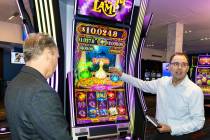INSIDE GAMING: Boyd deal sparks torrent of speculation

A New York-based hedge fund acquired a 5 percent ownership stake in Boyd Gaming Corp. last week and immediately fueled rampant speculation in the investment community.
Scenarios ranged from a corporate takeover to moving the company’s casinos into a real estate investment trust.
Don’t expect a quick resolution.
Elliott Associates, controlled by financier Paul Singer, said in a Securities and Exchange Commission filing late Monday that it thought Boyd’s price per share was undervalued. The stock purchase “represented an attractive investment opportunity.”
The next day, Boyd Gaming shares gained more 16.53 percent on the New York Stock Exchange. By Friday, Boyd’s stock price was at $13.82.
Elliott has a history of buying into distressed or undervalued companies and its track record led analysts to believe the hedge fund will be more than just a passive investor.
Sterne Agee gaming analyst David Bain said he thought Elliott would try to push Boyd management into adopting a real estate investment trust structure to increase the company’s value.
By law, the model — referred to as a REIT — doesn’t pay federal income taxes. With real estate as the primary source of income, REITs are required to distribute at least 90 percent of their taxable earnings to shareholders.
In 2013, Penn National Gaming spun off 21 of the company’s 29 casinos and racetracks, including M Resort, into Gaming and Leisure Properties. The REIT owns the casinos; Penn National is the management company.
Wall Street likes Penn’s new structure. In December, Gaming and Leisure Properties bought the real estate associated with the Casino Queen in East St. Louis, Ill., leasing the casino back to the current operator. Gaming analysts expect Gaming and Leisure Properties to strike other deals throughout 2014.
Bain speculated the REIT concept could be Elliott’s vision for Boyd, which operates 22 casinos in eight states. In Las Vegas, Boyd owns three downtown casinos and six large and small casinos in the locals market.
“A conversion to a REIT concurrent with an equity offering unlocks significant value, renovating Boyd into a growth company,” Bain said.
The challenge is Boyd’s current ownership structure. About 30 percent of outstanding shares are controlled by Bill Boyd, who founded the company with his father, Sam Boyd, and family members.
Janney Montgomery Scott gaming analyst Brian McGill said he thought a REIT conversion wouldn’t fly based on the company’s model. The Boyd family would have to significantly reduce its ownership stake.
“For the REIT spin to work, no individual can own greater than 10 percent of shares outstanding,” McGill said. “That said, we think it would take exceptionally long, if ever, for the pieces to fall into place.”
Boyd Gaming didn’t have much to say about the Elliott announcement.
In an emailed statement, company spokesman David Strow said, “We have noted Monday’s filing with the SEC, and we always appreciate new investments in the company.”
Boyd’s fourth-quarter net loss of $47.3 million disappointed analysts. Most didn’t change their opinion of Boyd, which saw a boost in business from its downtown casinos and steady growth from the locals market.
The company’s flagship property is the Borgata in Atlantic City, which is the market leader in both land-based and online gaming.
During the company’s fourth-quarter earnings call with analysts, Boyd Gaming Chief Financial Officer Josh Hirsberg was asked specifically whether REITs might be a new business model for the gaming industry. His answer was nonspecific.
“We’re always interested in growing the company and looking for initiatives to create shareholder value,” Hirsberg said.
Nevada gaming regulations allow institutional investors such as Elliott to own as much as 25 percent of a publicly traded company without having to obtain a license or a finding of suitability. The change was made in 2010 to open the industry to new investment.
That brought such names as hedge fund billionaire John Paulson into the mix. He has large stakes in MGM Resorts International, Caesars Entertainment Corp. and Boyd Gaming.
Elliott Associates doesn’t appear to be passive. In the filing, the company said it may meet with management and other shareholders and “formulate plans or proposals regarding” Boyd.
Singer, 69, is No. 1,154 on the recently released Forbes List of the World’s Billionaires, with a net worth of $1.5 billion.
In 2013, he waged a war with the energy giant Hess Corp., winning three seats on the company’s board of directors after a four-month proxy fight. His hedge fund, which he founded in 1977, raised more than $3 billion from investors in 2013.
Singer is also active politically.
In 2012 he was a prominent financial backer of Republican causes and 2012 GOP presidential nominee Mitt Romney. Singer is also a major supporter of legalizing same-sex marriage, even creating a political action committee to encourage like-minded Republicans to join the effort.
Representatives for the hedge fund did not respond to an email request for comment.
One thing is certain: Elliott’s investment has shined a spotlight on Boyd Gaming.
Stifel Nicolaus Capital Markets gaming analyst Steven Wieczynski didn’t want to speculate on Elliott’s intentions or what it means for Boyd investors over time. However, he said he believes the casino operator needs to find a way to unlock value.
“Our fundamental view on the Boyd investment case remains unchanged … in light of a less than inspiring 2014 outlook and with what we view as limited attractive near-term growth opportunities,” Wieczynski said.
Howard Stutz’s Inside Gaming column appears Sundays. He can be reached at hstutz@reviewjournal.com or 702-477-3871. Follow @howardstutz on Twitter.


















